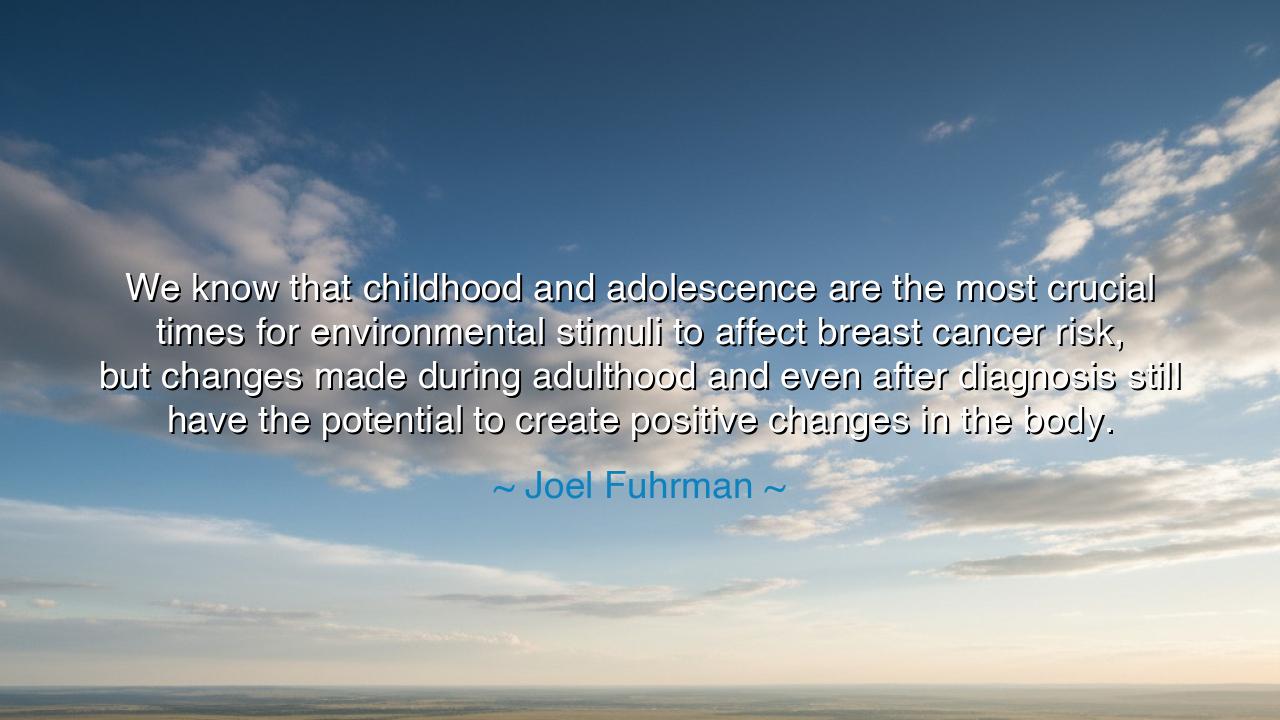
We know that childhood and adolescence are the most crucial times
We know that childhood and adolescence are the most crucial times for environmental stimuli to affect breast cancer risk, but changes made during adulthood and even after diagnosis still have the potential to create positive changes in the body.






Hearken to the wisdom of the physician and teacher Joel Fuhrman, who spoke with clarity and compassion: “We know that childhood and adolescence are the most crucial times for environmental stimuli to affect breast cancer risk, but changes made during adulthood and even after diagnosis still have the potential to create positive changes in the body.” These words shine like a beacon, reminding us that though the seeds of health and disease are sown in youth, the soil of life is never beyond redemption. What has been planted may bear fruit, but even in later years, the gardener may prune, may water, may turn the soil toward healing.
Mark well the first truth he declares: that childhood and adolescence are sacred windows of destiny, where the body, tender and unformed, drinks deeply of the world around it. Food, air, stress, and nurture—all become threads woven into the fabric of a young life. The habits of diet, the exposure to toxins, the strength or weakness of the body’s defenses—these early influences mold the future, and their power cannot be denied. The wise, therefore, guard the young with care, for what is sown then echoes across decades.
Yet Fuhrman does not leave us to despair. He proclaims also the second truth: that even in adulthood, and even after diagnosis, the body is not a closed book. The flame of life burns with resilience, and the human frame responds to change with surprising grace. To turn toward wholesome nourishment, to reduce the poisons of excess, to strengthen the body with movement, to calm the spirit with peace—these acts are not in vain. The temple of the body, though scarred by years, yet responds to the reverence of care.
Consider the tale of Hippocrates, father of medicine, who walked among the sick of ancient Greece. He found some who despaired, believing their fates sealed, and he told them: “Let food be thy medicine, and medicine be thy food.” And many who heeded him lived longer, stronger, freer of suffering. Their stories echo Fuhrman’s wisdom: that life’s direction is not fixed as stone, but pliant as clay, capable of being reshaped even in later days.
Look also to the story of Dr. Dean Ornish in our own era, who guided patients with grave heart disease. Many were told their fate was certain, yet through radical changes—plant-based diets, exercise, stress reduction—they reversed damage once thought unchangeable. Their healing bore witness to the principle that the body longs toward life when given the chance. Likewise, Fuhrman assures us that even after diagnosis, it is not futility but hope that must guide us.
O listener, what lesson shall you take? It is this: do not delay in shaping your life toward health. Guard the youth fiercely, for their future is being written in every meal, every breath, every choice. Yet also, do not believe the lie that it is too late. Whether you are twenty or seventy, whether you are in radiant health or carrying the weight of illness, you may yet turn the tide. Each step toward purity, each act of nourishment, each decision of courage, is a seed of healing planted anew.
Therefore, act with reverence toward your body. Give it foods of life, not poisons of ease. Choose movement over idleness, rest over endless toil, and peace over worry. Teach the young by your example, but also teach yourself that change is always possible. Let Fuhrman’s words be your guiding star: that health is not only the gift of youth, but the harvest of choices made even in the autumn of life.
And let this be the wisdom carried forward: the past may shape us, but it does not bind us. The body is a vessel of resilience, and the spirit is a wellspring of renewal. Sow wisely in youth, but never cease sowing in age. For every day that dawns brings with it the chance to heal, to grow, and to live more fully.






AAdministratorAdministrator
Welcome, honored guests. Please leave a comment, we will respond soon